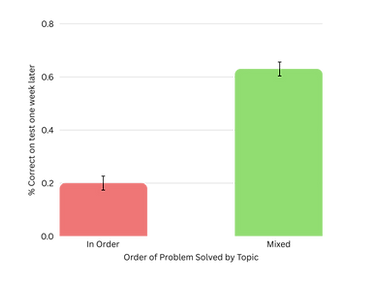The science-backed way to learn organic reactions fast
(5 minute read)
Organic chemistry reactions are a unique challenge, demanding both knowledge and problem-solving.
However, they become much easier once you understand the science behind learning and practice.
The problem with organic reaction flashcards

An electrophilic aromatic substitution
Throughout organic, you're expected to master about 50-100 named reactions, their mechanisms, and their products. If you rely on simple associations (such as flashcards), you're in deep trouble.
Flashcards form shallow associations that border on recognition more than recall [1]. Moreover, these isolated associations are fragmented, robbing you of a big-picture understanding [2].
Most crucially to organic, you can't flexibly apply shallow knowledge. And flexible application is essentially the theme of the course.
How to learn organic reactions using the science-backed method: free recall
Free recall means attempting to recall information without any help whatsoever. In this case: drawing out full examples of reactants, mechanisms, and product from memory.
It has all of the following advantages over cued recall, such as flashcards:
-
Makes knowledge more accessible in different situations [3]
-
Makes knowledge more transferable to new tasks [4]
-
Makes knowledge more durable and resistant to forgetting [5]
-
Strengthens related, unrecalled knowledge [6]
-
Strengthens knowledge you’ll learn in the future [7]
-
Makes knowledge more plastic, improving the effectiveness of re-study [8]
-
Prevents suppression of related knowledge if done correctly [9,10]
-
Prevents immediate feedback (meta-analyses find that delayed feedback consistently leads to better retention [19])
-
Surfaces more details per minute [11]
-
Requires no setup (no flashcards needed)
If the list above sounds nuts, that's because it is. Feel free to read more about free recall and why it works here.
Free recall works by forcing effortful retrieval, which reduces your knowledge’s dependence on cues and builds a more organized, flexible schema for every reaction.
And yes, free recall is difficult, just as any worthwhile learning is. You'll have to face all the difficulty eventually if you want to pass your exam, free recall just forces you to confront it all at once: turning a passive 3 hour study session into an effortful 30-minute one.
The main thing to look out for is error correction. Free recall increases the chance of mistakes, and mistakes can lock in wrong knowledge. Fortunately, the plasticity it creates makes correcting errors easier if you review reactions shortly after recalling them.
Repeat this recall-and-review cycle until each reaction sticks. If you do it enough, it works every time.
How to adapt free recall for organic reactions
As you perform recall and review, a few evidence-backed techniques can multiply your efficiency, saving a lot of time in the long run.
One powerful approach is linking reactions to existing knowledge. This elaborative encoding deepens learning and works synergistically with free recall and review, making knowledge more accessible, durable, and transferable to new tasks [12,13].
The quality of these connections depends on the strength of the prior knowledge you're connecting to. My favorite strategy is to explain "why?", because answering that question connects your knowledge to an extremely strong schema: your understanding of how things work. This stronger connection multiplies the benefits above [13,14].
Lastly, explaining why while drawing these reactions leverages another extremely powerful effect called dual coding. When you engage visually and verbally at the same time, you leverage both independent channels of your working memory. Because these channels don't significantly overlap, your ability to process information nearly doubles compared to just drawing or just explaining [15,16].
Practicing organic reactions effectively with interleaving
When it comes to organic reactions, knowledge is useless without practice. Reactions demand applying these rules dynamically to unpredictable situations.
The key word above is "unpredictable".
Imagine that you solve a question bank of alkene addition reactions. Then you solve a question bank of Grignard reactions. Then hydrohalogenation. And so on.
This is called blocked practice, and it's weak. The task you're practicing doesn't reflect the upcoming exam whatsoever. It doesn't require you to pull out the correct knowledge and apply it to an unpredictable situation; rather you can just mindlessly complete the same procedure over and over again.
For instance, if you do 30 alkene addition reactions in a row, you only have to retrieve your knowledge of the reaction and apply it once, then you passively repeat the procedure 29 times.
Now consider a better way: interleaved practice. Everything is the same, except all the reaction types are mixed together. A big mixed question bank of alkene addition problems, grignards, hydrohalogenation, etc. Now the practice reflects your exam's task: you have to pull out the correct knowledge and apply it to an unpredictable situation [17,18].

Interleaving helps a lot more than one would would think. Who would you have guessed it can triple average exam performance, as it did in the study below [17].
Adapted from Rohrer, D., Dedrick, R. F., & Stershic, S. (2015). Interleaved practice improves mathematics learning. Journal of Educational Psychology, 107(3), 900–908. https://doi.org/10.1037/edu0000001

How to interleave organic reactions
My favorite way to interleave is to input the practice problems into a flashcard app like Anki.
Through the deck settings, you can have it feed you the practice problems in a random order. The extra benefit of this method is that such apps usually have a spaced repetition algorithm built in, so it will schedule you to revisit difficult problems at optimized intervals.
Key takeaways for mastering organic reactions quickly
Through effortful retrieval, elaborative encoding and dual coding you're not only learning the reactions as fast as humanly possible.
Not only that, but through interleaving, you're practicing them at triple the pace.
Now go forth and crush those organic reactions!
Studying isn't yoga...
...it’s powerlifting. Your brain adapts to deliberate, effortful practice—not 10,000 Anki cards.
Most students waste entire days “studying” without feeling prepared. SAM distills decades of cognitive science into a brutally efficient system that multiplies your results 3–4x.
I made the first part free, and it's just a 10 minute read. Read it, save hours, no strings attached. I'm sharing it because it's genuinely very useful and I want you to see for yourself.
Why SAM?
-
Add back 10–15 hours a week—the equivalent of a whole day—without falling behind.
-
Two-hour read. Lifetime return.
-
Zero guesswork. Zero wasted time. Know exactly what to do for every course, every exam, every semester.
-
Unlock med school, law school, or any grad program without burning out your time, energy, or sanity.

References:
1. Roediger, H. L., & Butler, A. C. (2011). The critical role of retrieval practice in long-term retention. Trends in Cognitive Sciences, 15(1), 20–27. 2. Karpicke, J. D., & Blunt, J. R. (2011). Retrieval practice produces more learning than elaborative studying with concept mapping. Science, 331(6018), 772–775. 3. Carpenter, S. K. (2012). Testing enhances the transfer of learning. Journal of Experimental Psychology: Learning, Memory, and Cognition, 38(1), 1–14. 4. Butler, A. C. (2010). Repeated testing produces superior transfer of learning relative to repeated study. Journal of Experimental Psychology: Learning, Memory, and Cognition, 36(5), 1118–1133. 5. Roediger, H. L., & Karpicke, J. D. (2006). Test-enhanced learning: Taking memory tests improves long-term retention. Psychological Science, 17(3), 249–255. 6. Chan, J. C. K. (2009). Retrieval-induced facilitation: Initially nontested material can benefit from prior testing of related material. Journal of Experimental Psychology: General, 138(1), 28–44. 7. Storm, B. C., Bjork, R. A., & Bjork, E. L. (2014). On the transfer of test-enhanced learning: Concepts and applications. Journal of Applied Research in Memory and Cognition, 3(3), 218–225. 8. Karpicke, J. D., & Roediger, H. L. (2007). Repeated retrieval during learning is the key to long-term retention. Journal of Memory and Language, 57(2), 151–162. 9. Anderson, M. C., Bjork, R. A., & Bjork, E. L. (1994). Remembering can cause forgetting: Retrieval dynamics in long-term memory. Journal of Experimental Psychology: Learning, Memory, and Cognition, 20(5), 1063–1087. 10. Storm, B. C., Bjork, R. A., & Bjork, E. L. (2008). Accelerated relearning after retrieval-induced forgetting. Journal of Experimental Psychology: Learning, Memory, and Cognition, 34(1), 230–236. 11. Tulving, E., & Pearlstone, Z. (1966). Availability versus accessibility of information in memory for words. Journal of Verbal Learning and Verbal Behavior, 5(4), 381–391. 12. Craik, F. I. M., & Lockhart, R. S. (1972). Levels of processing: A framework for memory research. Journal of Verbal Learning and Verbal Behavior, 11(6), 671–684. 13. Chi, M. T. H., Bassok, M., Lewis, M. W., Reimann, P., & Glaser, R. (1989). Self-explanations: How students study and use examples in learning to solve problems. Cognitive Science, 13(2), 145–182. 14. Fiorella, L., & Mayer, R. E. (2013). The relative benefits of learning by teaching and teaching expectancy. Contemporary Educational Psychology, 38(4), 281–288. 15. Paivio, A. (1991). Dual coding theory: Retrospect and current status. Canadian Journal of Psychology, 45(3), 255–287. 16. Mayer, R. E., & Anderson, R. B. (1991). Animations need narrations: An experimental test of a dual-coding hypothesis. Journal of Educational Psychology, 83(4), 484–490. 17. Rohrer, D., Dedrick, R. F., & Stershic, S. (2015). Interleaved practice improves mathematics learning. Journal of Educational Psychology, 107(3), 900–908. https://doi.org/10.1037/edu0000001 18. Rohrer, D., & Pashler, H. (2010). Recent research on human learning challenges conventional instructional strategies. Educational Researcher, 39(5), 406–412. 19. Brummer, L., de Boer, H., Mouw, J.M. et al. A meta-analysis of the effects of context, content, and task factors of digitally delivered instructional feedback on learning performance. Learning Environ Res 27, 453–476 (2024). https://doi.org/10.1007/s10984-024-09501-4



